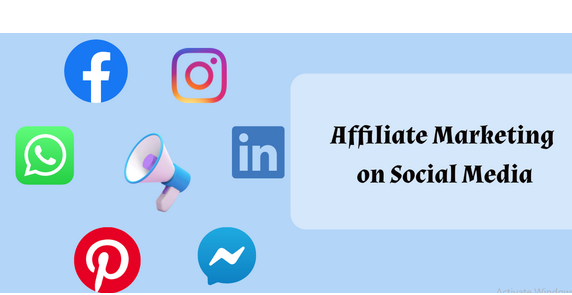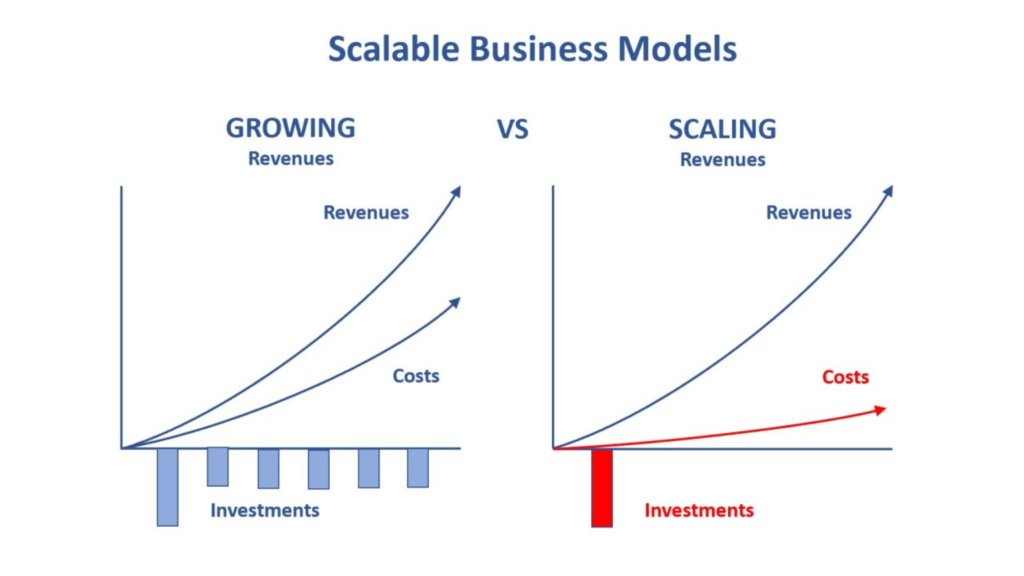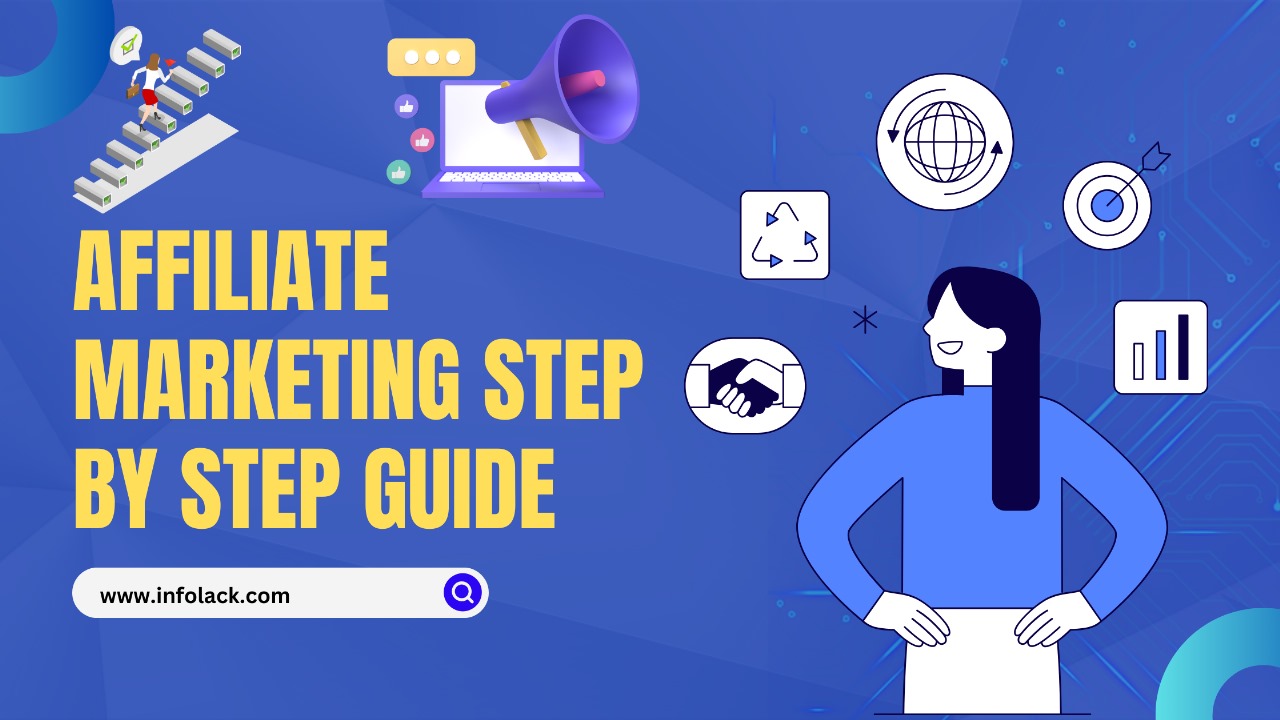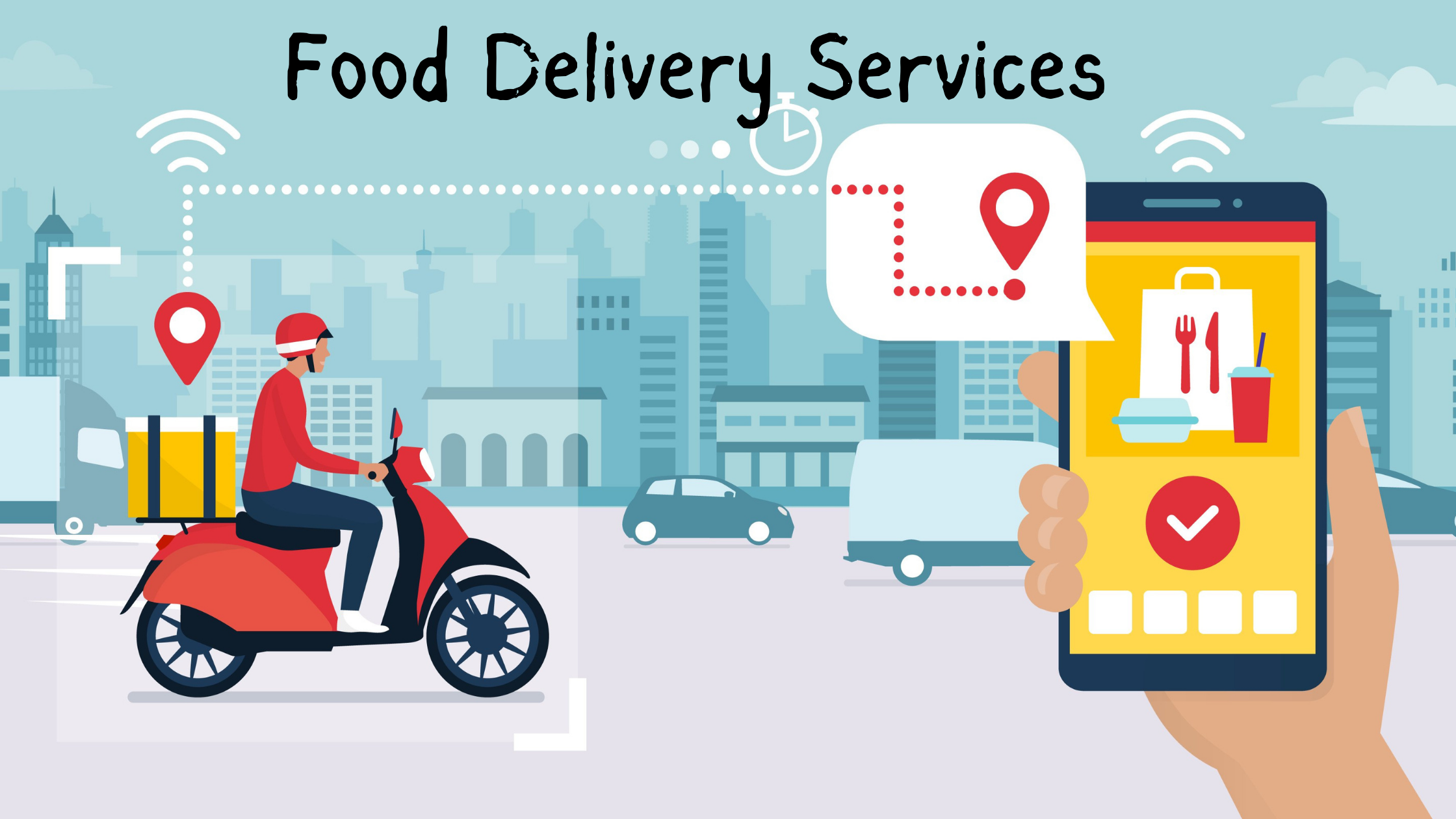Affiliate Marketing Step by Step Guide
Affiliate marketing has emerged as one of the most popular ways to make money online. It gives individuals and businesses the opportunity to make money by advertising the products or services of other companies. In this Affiliate Marketing Step by Step Guide, we will explore everything you need to know about affiliate marketing, including what it is, how it works, how to get started, and the advantages it offers. Whether you are a beginner or an experienced marketer looking to refine your strategies, this guide will provide you with the insights and tools needed to succeed.
What is Affiliate Marketing?

Affiliate advertising and marketing is an overall performance-primarily based advertising and marketing method wherein a character, referred to as an associate, earns a commission by promoting an organization’s services or products. The associate uses a unique link, referred to as an associate hyperlink, to force site visitors to the agency’s website. If the consumer performs a selected action, which include making a buy or signing up for a carrier, the affiliate earns a fee. This Affiliate Marketing Step by Step Guide will assist you understand how this method works and the way you may benefit from it.
Affiliate marketing is beneficial for both parties involved. Companies can attain a larger audience and growth income without the in advance expenses of conventional marketing, while affiliates can earn money without creating their personal services or products. By following this Affiliate Marketing Step by using Step Guide, you will discover ways to leverage those advantages to construct a success affiliate marketing method.
How Does Affiliate Marketing Work?

The process of affiliate marketing is straightforward but requires careful planning and execution. Here is how it works, broken down into steps within this Affiliate Marketing Step by Step Guide:
Joining an Affiliate Program:
The first step in this Affiliate Marketing Step by Step Guide is to sign up for an affiliate software. Companies like Amazon, eBay, and lots of others offer affiliate packages that allow individuals to sell their merchandise. Additionally, there are associate networks like Commission Junction, ClickBank, and ShareASale that connect affiliates with diverse companies.
Selecting Products to Promote:

After becoming a member of an associate software, the following step in the Affiliate Marketing Step by Step Guide is to select the goods or offerings you desire to sell. It is important to choose products that are relevant in your area of interest and that you accept as true with will resonate with your audience.
Generating Affiliate Links:
When you select promotional items, the affiliate program will provide you with a unique affiliate link. These links are important because they track your traffic and ensure you get credit for any sales or actions resulting from your ads. If you follow this Affiliate Marketing Step by Step Guide, you will learn how to use these links effectively.
Creating Content Around the Products:
Content is the cornerstone of affiliate marketing. Whether it is blog posts, videos, social media, or email newsletters, the content you create should provide value to your audience as you subtly promote products through your affiliate networks. This Affiliate Marketing Step by Step Guide will show you how to create content that produces results.
Promoting Your Content:

Once you have created content, the next step in this Affiliate Marketing Step by Step Guide is to promote it. Use various strategies like social media, SEO, paid advertising, and email marketing to drive traffic to your content. The more people see your content, the better your chances of earning a commission.
Earning Commissions:

When a user clicks on your affiliate link and completes an optional action, such as purchasing a product or signing up for a service, you earn a fee. The amount of money you earn may vary depending on the product and the commission structure of the affiliate program. This Affiliate Marketing Step by Step Guide will help you make great money.
Tracking and Optimizing Performance:
Successful affiliate marketing requires ongoing maintenance and development. Use tools like Google Analytics or an organizational software dashboard to track your performance. Analyzing metrics like click-through rates, conversion rates, and total sales will help you identify what is working and what needs to be improved. This Affiliate Marketing Step by Step Guide will show you how to work best for success.
How to Start Affiliate Marketing?
Starting with affiliate marketing is an exciting journey, but it requires careful planning and execution. Here is a step-by-step guide to help you get started:
Identify Your Niche:

The first step in the Affiliate Marketing Step by Step Guide is to choose a niche that matches your interests, skills, and target audience. A well-defined niche allows you to focus your efforts and create content that targets a specific group of people.
Build a Platform:
To succeed in affiliate marketing, you need a platform to share your content. This may be a blog, YouTube channel, podcast, or maybe a social media account. Your platform should to cater to your area of interest and function a space in which you can build and engage with your target audience.
Create Valuable Content:
Content is the heart of affiliate marketing. Focus on creating valuable content that matches your audience’s needs and interests. Whether it’s product reviews, how-to guides, or informative articles, your content should provide solutions and encourage readers to take action through your affiliate links. This Affiliate Marketing Step by Step Guide will give tips on content creation.
Join Relevant Affiliate Programs:
Once you have a platform and content, the next step to navigating in the Affiliate Marketing Step by Step Guide is to join affiliate programs that align with your niche. Research programs and choose those that offer products or services that your audience finds valuable.
Promote Your Affiliate Products:

Once you join affiliate programs, start promoting through your content. Include your affiliate links in your blog posts, videos, or social media posts. This Affiliate Marketing Step by Step Guide will help you develop effective promotion strategies.
Build an Email List:
Email lists are an effective tool for affiliate advertising. It lets in you to interact at once together with your target audience, percentage precious statistics, and sell affiliate products. Offer magnets which include free ebooks, books, or specific content material to encourage visitors to join your e-mail list.
Track Your Results and Optimize:

As you start promoting affiliate products, it is crucial to track your results. Analyze which products are performing well, which content is driving the most traffic, and where your conversions are coming from. Use this data to refine your strategies and optimize your efforts for better results. This Affiliate Marketing Step by Step Guide will guide you through this process.
Stay Consistent and Patient:
Affiliate marketing is not a get-wealthy-short scheme. It takes time to construct an audience, establish trust, and notice tremendous consequences. Stay regular for your efforts, hold developing treasured content, and be patient as you work closer to constructing a sustainable earnings movement.
Advantages of Affiliate Marketing
Affiliate marketing offers many advantages that make it an attractive option for those who want to make money online. Here are some key benefits, as outlined in this Affiliate Marketing Step by Step Guide:
Low Start-Up Costs:
One of the most important advantages of affiliate marketing is the low initial cost. Unlike traditional businesses, you do not need to invest in inventory, production, or shipping. All you need is a platform, content, and links to affiliate programs.
Flexibility and Freedom:

Affiliate marketing offers an unparalleled experience. You can work from anywhere, create your own schedule, and choose promotions. This freedom allows you to create a lifestyle that suits your own interests and purposes.
Passive Income Potential:
Once you have your content and promotional strategies in place, affiliate marketing can generate passive income. Even when you sleep, your content can still drive traffic and sales, and earn commissions all day long. This Affiliate Marketing Step by Step Guide focuses on the importance of setting up these plans.
Diverse Income Streams:
In affiliate marketing, it’s not about promoting a single product or service. You can diversify your revenue stream by including several affiliate programs and promoting different products within your website. This flexibility reduces risk and increases your potential income.
Scalability:

Affiliate marketing is very simple. As your audience grows, so does your potential revenue. The more traffic you drive through your affiliate links, the more commissions you can earn. These changes make affiliate marketing a lucrative opportunity for long-term growth.
No Customer Service or Inventory Management:
One of the biggest challenges of running a traditional business is managing customer service and inventory. With affiliate marketing, you do not have to worry about these aspects. The company you are promoting handles all customer interactions and product fulfillment, allowing you to focus solely on promotion.
Common Challenges in Affiliate Marketing
While affiliate marketing offers many benefits, it is not without its challenges. In this Affiliate Marketing Step by Step Guide, it is important to acknowledge these challenges so you can be better equipped to overcome them:
Building Trust with Your Audience:

Trust is the foundation of successful corporate business. If your audience does not believe in your recommendations, they will not click on your affiliate links or make a purchase. Building trust takes time, and it is just as much about being honest and transparent about your information.
Finding the Right Products to Promote:
Not all affiliate products are created equal. Finding products that resonate with your audience and provide real value can be challenging. It is important to thoroughly research products before promoting them to ensure they align with your audience’s needs and interests.
Managing Competition:

The affiliate marketing space is very competitive. Many organizations are advertising the same products, making it difficult to stand out. To succeed, you must distinguish yourself by providing unique insights, valuable information, and a strong personal brand. This Affiliate Marketing Step by Step Guide provides steps to stand out in a crowded marketplace.
Dealing with Changing Algorithms:
Organizations rely on places like Google or social media to drive traffic. However, these sites frequently update their algorithms, which can affect your traffic and revenue. Staying aware of change and adapting your strategies is essential to long-term success.
Tracking and Attribution Issues:
Accurate instructions are important to ensure you get credit for the sale you have made. However, tracking can sometimes be unreliable due to technical issues, ad blockers, or cookie expiration. It is important to work with affiliate programs that have robust monitoring systems and monitor your performance on a regular basis. This Affiliate Marketing Step by Step Guide will show you how to navigate these challenges.
Staying Motivated:

Affiliate marketing always requires effort, and it can take time to figure out what is important. It is easy to get discouraged, especially when you are just starting out. Staying motivated, achievable goals, and celebrating small victories are essential to long-term success. This Affiliate Marketing Step by Step Guide focuses on the importance of patience.
Conclusion
Affiliate advertising and marketing is a effective and versatile manner to earn money online. By following this Affiliate Marketing Step by Step Guide, you’ll have the knowledge and gear to begin and achieve this thrilling discipline. From understanding what associate advertising is to learning how it works, the way to get began, and the benefits it gives, this manual offers a comprehensive evaluation of the whole thing you want to recognize.
Remember, the important thing to fulfillment in affiliate marketing lies in selecting the right niche, growing precious content, promoting continuously, and staying informed approximately enterprise tendencies. With time, effort, and determination, associate advertising can become a sizeable supply of earnings, supplying you with the ability and freedom to obtain your monetary desires. Whether you’re a beginner or an skilled marketer, this Affiliate Marketing Step by Step Guide will help you navigate the course to achievement. You can explore more about startup ideas for students in India here. As well as you explore more.
People also ask
What should a beginner do in affiliate marketing?
To start with affiliate marketing, beginners should first choose a niche they are passionate about and research the market demand for related products or services. Next, they should sign up for reputable affiliate programs like Amazon Associates, ShareASale, or niche-specific platforms. Building a website or blog is essential to create valuable, relevant content that attracts their target audience. Promoting products naturally within their content through blog posts, reviews, or social media is key. Lastly, it’s important to track performance and optimize their strategy based on what resonates with their audience.
How do I get my first affiliate sale?
To get your first affiliate sale, focus on creating high-quality, targeted content that offers value to your audience. Promote affiliate products through blog posts, reviews, or social media, and share these with your network. Use SEO and relevant keywords to attract traffic, and be consistent with your efforts.
Which affiliate program pays daily?
Affiliate programs like MaxBounty, PeerFly, and CPALead offer daily payouts, but they usually require affiliates to meet certain conditions, such as reaching a minimum earnings threshold or maintaining consistent performance.
Is affiliate market easy?
Affiliate marketing can be easy to start, but success requires time, effort, and consistency. It involves learning how to create valuable content, drive traffic, and build trust with your audience to generate sales.
Lorem ipsum dolor sit amet, consectetur adipiscing elit. Ut elit tellus, luctus nec ullamcorper mattis, pulvinar dapibus leo.
How do I start an affiliate income?
To start earning affiliate income, choose a niche, join affiliate programs, and create content that promotes relevant products. Focus on driving traffic to your website or platform through SEO, social media, or email marketing, and include affiliate links naturally in your content.
What is the first step of affiliate marketing?
The first step of affiliate marketing is choosing a specific niche that aligns with your interests and has a profitable audience. This helps you focus on the right products and content to promote.








































